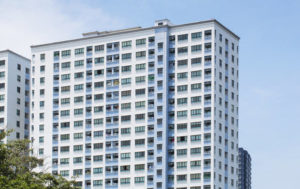In many ways, condominium ownership is similar to home ownership. For example, when you initially purchase a condo, your mortgage company will likely require you to purchase property insurance for your unit. However, when it comes to property insurance claims, there are also some important differences between condominiums and single homes. It is imperative that all condo owners understand their rights and responsibilities as well as exactly what is covered by their property insurance policy.
Who is Responsible for Condo Damage?
The answer to this question depends on many different factors. You will need to know how the damage occurred and how your insurance coverage works. Consider the example of a water leak. Your condo could suffer water leak damage in several different ways. It could be that your upstairs neighbor caused the issue. Alternatively, a pipe could have burst inside a common condo unit wall. Regardless, condo damage always has the potential to create a complex property insurance claim situation. On a basic level these type of claims will be controlled by the Florida Uniform Condominium Act and by your insurance policy. While you or another property owner in your building may be responsible for the damage, it could also be the condominium association itself. The condominium association’s claims are covered through something known as a master policy.
What is a Master Policy?
While condo owners do not own the entirety of their building complex, it is clear that they do possess some stake in the building itself. Purely from the perspective of insurance providers, all condo owners have a shared duty to care for the common features of the building. Insurance premiums for the master policy are usually paid for through monthly or annual condo fees. As a general rule, a master policy will cover the common areas and features of a complex. However, it is not always so clear as to exactly what kind of damage amounts to a common responsibility and what is an individual responsibility. If you have suffered condo damage, you should get your hands on a copy of the master policy immediately. There are many variations in these type of policies, though they do typically come in one of two basic forms:
- All-in policy: This is a more comprehensive type of master policy that will cover everything inside your unit that is not personal property. This means that things like wiring, appliances and countertops are often covered.
- Bare-walls in policy: This type of master policy generally does not cover anything within the confines of your individual unit. It will almost certainly not cover any appliances or carpeting, and it may not even cover things like your wiring or plumbing.
Ultimately, condo owners should get a handle on their insurance situation as soon as possible. The last thing you want is a surprise that your condo damage is not actually covered by any insurance policy.
Contact Our Office Today
At Geyer Fuxa Tyler, our passionate lawyers have extensive experience handling a wide variety property insurance disputes, including claims involving condominium insurance. If your condominium property insurance claim has been denied, please contact our office today to schedule a free review of your case. Our firm represents clients throughout Broward County, including in Deerfield Beach and Lauderhill.





